- Home
- Georgette Heyer
Grand Sophy Page 3
Grand Sophy Read online
Page 3
‘Oh, no, I could not, Charles! It might be quite unexceptionable! Besides – why, it might even contain a message from his mother for me!’
‘Highly unlikely, but if you think that, you had better read it.’
‘Of course, I know it is my duty to do so,’ she agreed unhappily.
He looked rather contemptuous, but said nothing, and after a moment’s indecision she broke the seal, and spread open the single sheet. ‘Oh, dear, it is a poem!’ she announced. ‘I must say, it is very pretty! Listen, Charles! Nymph, when thy mild cerulean gaze Upon my restless spirit casts it beam –’
‘I thank you, I have no taste for verse!’ interrupted Mr Rivenhall harshly. ‘Put it on the fire, ma’am, and tell Cecilia she is not to be receiving letters without your sanction!’
‘Yes, but do you think I should burn it, Charles? Only think if this were the only copy of the poem! Perhaps he wants to have it printed!’
‘He is not going to print such stuff about any sister of mine!’ said Mr Rivenhall grimly, holding out an imperative hand.
Lady Ombersley, always overborne by a stronger will, was just about to give the paper to him when a trembling voice from the doorway arrested her: ‘Mama! Do not!’
Two
Lady Ombersley’s hand dropped; Mr Rivenhall turned sharply, a frown on his brow. His sister, casting him a look of burning reproach, ran across the room to her mother, and said: ‘Give it to me, Mama! What right has Charles to burn my letters?’
Lady Ombersley looked helplessly at her son, but he said nothing. Cecilia twitched the open sheet of paper from her mother’s fingers, and clasped it to her palpitating bosom. This did goad Mr Rivenhall into speech. ‘For God’s sake, Cecilia, let us have no play-acting!’ he said.
‘How dare you read my letter?’ she retorted.
‘I did not read your letter! I gave it to Mama, and you will scarcely say that she had no right to read it!’
Her soft blue eyes swam with tears; she said in a low voice: ‘It is all your fault! Mama would never – I hate you, Charles! I hate you!’
He shrugged, and turned away. Lady Ombersley said feebly: ‘You should not talk so, Cecilia! You know it is quite improper in you to be receiving letters without my knowledge! I do not know what your Papa would say if he heard of it.’
‘Papa!’ exclaimed Cecilia scornfully. ‘No! It is Charles who delights in making me unhappy!’
He glanced over his shoulder at her. ‘It would be useless, I collect, to say that my earnest wish is that you should not be made unhappy!’
She returned no answer, but folded the letter with shaking hands, and bestowed it in her bosom, throwing a defiant look at him as she did so. It was met with one of contempt; Mr Rivenhall propped his shoulders against the mantelshelf, dug his hands into his breeches’ pockets, and waited sardonically for what she might say next.
She dried her eyes instead, catching her breath on little sobs. She was a very lovely girl, with pale golden locks arranged in ringlets about an exquisitely shaped face, whose delicate complexion was at the moment heightened, not unbecomingly, by an angry flush. In general, her expression was one of sweet pensiveness, but the agitation of the moment had kindled a martial spark in her eyes, and she was gripping her underlip between her teeth in a way that made her look quite vicious. Her brother, cynically observing this, said that she should make a practice of losing her temper, since it improved her, lending animation to a countenance well enough in its way but a trifle insipid.
This unkind remark left Cecilia unmoved. She could hardly fail to know that she was much admired, but she was a very modest girl, quite unappreciative of her own beauty, and would much have preferred to have been fashionably dark. She sighed, released her lip, and sat down on a low chair beside her Mama’s sofa, saying in a more moderate tone: ‘You cannot deny, Charles, that it is your doing that Mama has taken this – this unaccountable dislike to Augustus!’
‘Now, there,’ said Lady Ombersley earnestly, ‘you are at fault, dearest, for I do not dislike him at all! Only I cannot think him an eligible husband!’
‘I don’t care for that!’ declared Cecilia. ‘He is the only man for whom I could ever feel that degree of attachment which – in short, I beg you will abandon any notion you may have that I could ever entertain Lord Charlbury’s extremely flattering proposal, for I never shall!’
Lady Ombersley uttered a distressful but incoherent protest; Mr Rivenhall said in his prosaic way: ‘Yet you were not, I fancy, so much averse from Charlbury’s proposal when it was first told you.’
Cecilia turned her lambent gaze upon him, and answered: ‘I had not then met Augustus.’
Lady Ombersley appeared to be a good deal struck by the logic of this pronouncement, but her son was less impressionable. He said: ‘Don’t waste these high flights on me, I beg of you! You have been acquainted with young Fawnhope any time these nineteen years!’
‘It was not the same,’ said Cecilia simply.
‘That,’ said Lady Ombersley, in a judicial way, ‘is perfectly true, Charles. I am sure he was the most ordinary little boy, and when he was up at Oxford he had the most dreadful spots, so that no one would have supposed he would have grown into such an excessively handsome young man! But the time he spent in Brussels with Sir Charles Stuart improved him out of all knowledge! I own, I never should have known him for the same man!’
‘I have sometimes wondered,’ retorted Mr Rivenhall, ‘whether Sir Charles will ever be the same man again either! How Lady Lutterworth can have reconciled it with her conscience to have foisted upon a public man such a nincompoop to be his secretary I must leave it to herself to decide! All we are privileged to know is that your precious Augustus no longer fills that office! Or any other!’ he added trenchantly.
‘Augustus,’ said Cecilia loftily, ‘is a poet. He is quite unfitted for the – the humdrum business of an ambassador’s secretary.’
‘I do not deny it,’ said Mr Rivenhall. ‘He is equally unfitted to support a wife, my dear sister. Do not imagine that I will frank you in this folly, for I tell you now I will not! And do not delude yourself into believing that you will obtain my father’s consent to this most imprudent match, for while I have anything to say you will not!’
‘I know well that it is only you who have anything to say in this house!’ cried Cecilia, large tear-drops welling over her eyelids. ‘I hope that when you have driven me to desperation you may be satisfied!’
From the tightening of the muscles about his mouth it was to be seen that Mr Rivenhall was making a praise-worthy effort to keep his none too amiable temper in check. His mother glanced anxiously up at him, but the voice in which he answered Cecilia was almost alarmingly even. ‘Will you, my dear sister, have the goodness to reserve these Cheltenham tragedies for some moment when I am not within hearing? And before you carry Mama away upon the tide of all this rodomontade, may I be permitted to remind you that so far from being forced into a unwelcome marriage you expressed your willingness to listen to what you have yourself described as Lord Charlbury’s very flattering offer?’
Lady Ombersley leaned forward to take one of Cecilia’s hands in hers, and to squeeze it compassionately. ‘Well, you know, my dearest love, that is quite true!’ she said. ‘Indeed, I thought you liked him excessively! You must not imagine that Papa or I have the least notion of compelling you to marry anyone whom you hold in aversion, for I am sure that such a thing would be quite shocking! And Charles would not do so either, would you, dear Charles?’
‘No, certainly not. But neither would I consent to her marriage with any such frippery fellow as Augustus Fawnhope!’
‘Augustus,’ announced Cecelia, putting up her chin, ‘will be remembered long after you have sunk into oblivion!’
‘By his creditors? I don’t doubt it. Will that compensate you for a lifetime spent in dodging duns?’
Lady Ombersley could not repress a shudder. ‘Alas, my love, it is too true! You cannot know the mortification –
but we will not speak of that!’
‘It was useless to speak to my sister of anything outside the covers of a novel from the lending-library!’ said Charles. ‘I might have supposed that she would be thankful, in the state to which this family has been reduced, to have been on the point of contracting even a respectable alliance! But no! She is offered not a respectable but a brilliant match, and she chooses to behave like any Bath Miss, swooning and languishing over a poet! A poet! Good God, Mama, if the specimen of his talent which you were so ill-advised as to read me – but I have no patience to argue further on that head! If you cannot prevail upon her to conduct herself in a manner worthy of her breeding she had better be sent down to Ombersley, to rusticate for a while, and see if that will bring her to her senses!’
With this terrible threat he strode out of the room, leaving his sister to dissolve into tears, and his mother to recruit her strength through the medium of the vinaigrette.
Between sobs Cecilia animadverted for some moments on the cruelty of fate, which had saddled her with a brother who was as heartless as he was tyrannical, and parents who were totally unable to enter into her feelings. Lady Ombersley, though sympathetic in the main, could not allow this to pass. Without taking it upon herself to answer for her husband’s sensibilities, she assured Cecilia that her own were extremely nice, making it perfectly possible for her to appreciate the anguish of a forbidden love.
‘When I was a girl, dearest, something of the same nature happened to me,’ she said, sighing. ‘He was not a poet, of course, but I fancied myself very much in love with him. But it would not do, and in the end I was married to your Papa, which was thought to be a splendid match, for in those days he had scarcely began to run through his fortune, and –’ She broke off, realizing that these reminiscences were infelicitous. ‘In short, Cecilia, – and I should not be obliged to say this to you – persons of our order do not marry only to please themselves.’
Cecilia was silenced, and could only hang down her head, dabbing at her eyes with an already damp handkerchief. She knew herself to have been a good deal indulged through the fondness of one parent and the cheerful indifference of the other, and was well aware that in discovering her inclination before permitting Lord Charlbury to address his suit to her Lady Ombersley had shown more consideration for her than would have been approved of by the greater part of her contemporaries. Cecilia might read novels, but she knew that the spirited behaviour of her favourite heroines was not for her to imitate. She foresaw that she was doomed to spinsterhood; and this reflection was so melancholy that she drooped more than ever, and once more applied her handkerchief to her eyes.
‘Only think how happy your sister is!’ said Lady Ombersley, in a heartening tone. ‘I am sure nothing could be more gratifying than to see her in her own home, with her dear baby, and James so attentive and obliging, and – and everything just what one would wish! I declare I did not believe that any love-match could have turned out better – not that I mean to say that Maria is not sincerely attached to James! But she had not met him above half a dozen times when he asked Papa’s leave to speak to her, and her affections were not engaged. Naturally, she felt a strong degree of liking, or I should never – but Maria was such a good, pretty-behaved girl! She told me herself that she felt it to be her duty to accept such a respectable offer, with Papa in such difficulties, and four more of you to be provided for!’
‘Mama, I hope I am not an unnatural daughter, but I had rather be dead than married to James!’ declared Cecilia, raising her head. ‘He thinks of nothing but hunting, and when they do have company in the evening, he goes to sleep, and snores!’
Daunted by this disclosure, Lady Ombersley could find nothing to say for a minute to two. Cecilia blew her nose, and added: ‘And Lord Charlbury is even older than James!’
‘Yes, but we do not know that he snores, my love,’ Lady Ombersley pointed out. ‘Indeed, we may be almost certain that he does not, for his manners are so very gentleman-like!’
‘A man who would contract the mumps,’ declared Cecilia, ‘would do anything!’
Lady Ombersley saw nothing unreasonable in this pronouncement, nor was she surprised that his lordship’s unromantic behaviour had given Cecilia a distaste for him. She had herself been sadly disappointed, for she had thought him a man of sense, certainly not one to be succumbing to childish ailments at inopportune moments. She could think of nothing to say to palliate his offence, and as Cecilia had apparently no further observations to make, silence reigned uneasily for a time. Cecilia presently broke it, asking rather listlessly whether it was true that her uncle had been in the house that afternoon. Glad of an excuse to talk of more cheerful matters, Lady Ombersley at once told her of the treat in store for her, and had the satisfaction of seeing the cloud lift a little from her daughter’s brow. It was not difficult to enlist Cecilia’s sympathies on behalf of her cousin: she could scarcely envisage a more horrid fate than to be sent to stay for an indefinite period amongst relatives who were almost strangers, and warmly promised to do all that lay in her power to make Sophia feel herself at home in Berkeley Square. She could conjure up no very clear recollection of her cousin, for it had been some years since they had met; and although she had sometimes thought that to travel about Europe must be exciting, she had also suspected that it might also be extremely uncomfortable, and readily agreed with Lady Ombersley that such an unconventional existence was scarcely an ideal preparation for a London début. The reflection that Sophia’s arrival in Berkeley Square must mean some relaxation of the almost conventual life imposed upon the family by Charles’s determination to economize sent her away to change her dress for dinner, in a far happier frame of mind.
Four of the family sat down at the huge table in the dining-room that evening, his lordship having decided to gratify his wife with one of his rare appearances at his own board. He was the only unconstrained member of the party, for he had a happy disposition which made it possible for him to remain oblivious to the most blatant signs of discontent in his companions. In the same spirit he contrived with amazing ease to be cheerful under the humiliation of being little more than his son’s pensioner. He had the greatest dread of being obliged to face unpleasantness, so he never allowed himself to think about unpleasant things, which answered very well, and could be supported in times of really inescapable stress by his genius for persuading himself that any disagreeable necessity forced upon him by his own folly, or his son’s overriding will, was the outcome of his own choice and wise decision. While Charles continued to render him the observances of filial respect he was able to forget that the reins of government had been wrenched out of his hands; and when, as sometimes happened, filial respect wore a little thin, at least these regrettable lapses did not last for long, and were not difficult for a man of his sanguine temperament to forget. He bore his son no malice, though he thought him a dull dog; and provided that the luck was running his way, and he was not expected to bear any distasteful part in the management of his young family, he was very well satisfied with his lot.
He could hardly have been unaware of the dissension at present raging in his household, for a request from his wife that he should exercise parental authority over Cecilia had driven him post-haste to Newmarket not a fortnight before. But neither his son’s heavy frown, nor his daughter’s reddened eyelids, occasioned the slightest comment from him. He appeared to derive no small satisfaction from partaking of a lengthy meal in the company of an anxious wife, an injured daughter, and a glowering son. He said: ‘Well, upon my soul, this is very pleasant, to be dining en famille in this cosy way! You may tell your cook, Lady Ombersley, that I like this way of serving a duck. I declare I don’t get as good at White’s!’ After that he recounted the latest piece of society gossip, and enquired affably how his children had spent the day.
‘If you mean me, Papa,’ said Cecilia, ‘I have spent the day just as I spend every day. I shopped with Mama; I walked in the Park with my sisters and Miss Adderbury
; and I practised my music.’
Her tone did not suggest that she had found these amusements exhilarating, but Lord Ombersley said Capital! and turned his attention to his wife. She told him of her brother’s visit, and of his proposal that she should assume the charge of Sophia; and Lord Ombersley gave his gracious consent to the scheme, saying that nothing could be better, and congratulating his daughter upon her good luck in so unexpectedly acquiring a charming companion. Charles, who was irritated enough by all this bland insensibility to sympathize with his sister, said dampingly that they had as yet no reason to suppose that Sophia would be in the least charming. But Lord Ombersley said that he entertained no doubts on that head, and added that they must all do their best to make their cousin’s stay agreeable. After that, he asked Charles whether he intended to go to the races next day. Charles, who knew that the races referred to were run under the patronage of the Duke of York, and would entail, for that jovial personage’s cronies, several evenings spent at Oatlands, playing whist for pound points, looked more forbidding than ever, and said that he was going down to Ombersley Park for a few days.
‘To be sure you are!’ agreed his father cheerfully. ‘I was forgetting that business about the South Hanger. Yes, yes, I wish you will attend to that, my boy!’
‘I will, sir,’ responded Mr Rivenhall politely. He then glanced across the table at his sister, and asked: ‘Do you care to accompany me, Cecilia? I am very willing to take you, if you should like it.’
She hesitated. This might be an olive-branch; on the other hand it might be a singularly futile attempt to wean her mind from thoughts of Mr Fawnhope. The reflection that Charles’s absence from town might, with a little contrivance, make it possible for her to meet Mr Fawnhope decided the matter. She shrugged, and said: ‘No, I thank you. I do not know what I should do in the country at this season.’
‘Ride with me,’ suggested Charles.
‘I prefer to ride in the Park. If you desire company, I wonder you do not invite the children to go with you: I am sure they would be delighted to oblige you.’

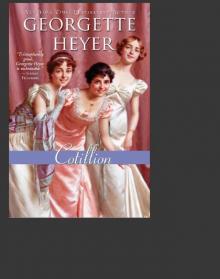 Cotillion
Cotillion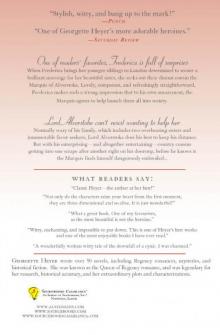 Frederica
Frederica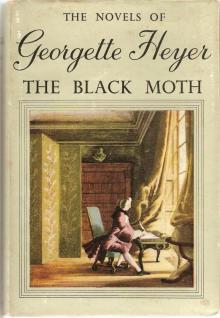 The Black Moth: A Romance of the XVIIIth Century
The Black Moth: A Romance of the XVIIIth Century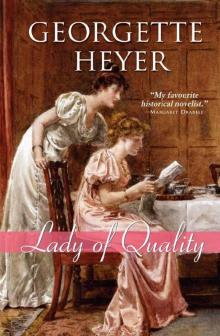 Lady of Quality
Lady of Quality Snowdrift and Other Stories
Snowdrift and Other Stories An Infamous Army
An Infamous Army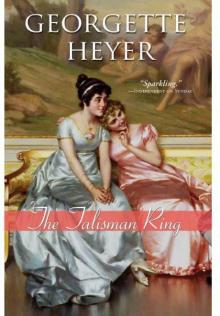 The Talisman Ring
The Talisman Ring Venetia
Venetia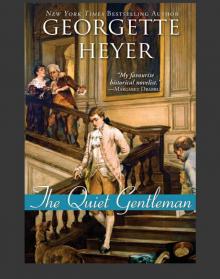 The Quiet Gentleman
The Quiet Gentleman Duplicate Death
Duplicate Death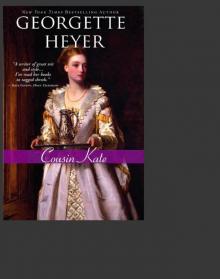 Cousin Kate
Cousin Kate Black Sheep
Black Sheep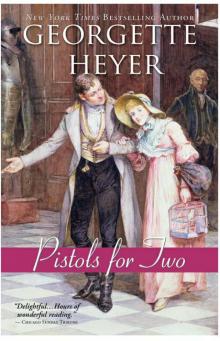 Pistols for Two
Pistols for Two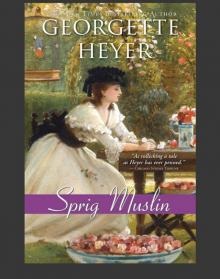 Sprig Muslin
Sprig Muslin No Wind of Blame
No Wind of Blame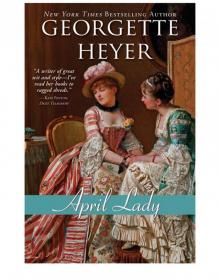 April Lady
April Lady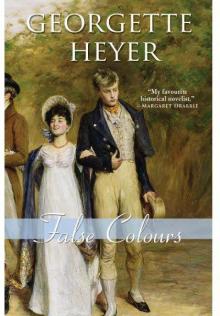 False Colours
False Colours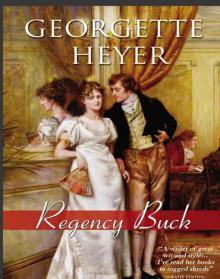 Regency Buck
Regency Buck The Toll-Gate
The Toll-Gate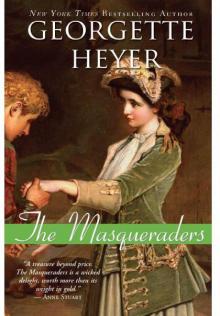 The Masqueraders
The Masqueraders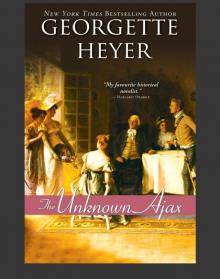 The Unknown Ajax
The Unknown Ajax The Grand Sophy
The Grand Sophy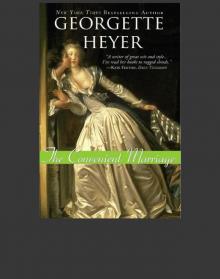 The Convenient Marriage
The Convenient Marriage Faro's Daughter
Faro's Daughter The Conqueror
The Conqueror The Foundling
The Foundling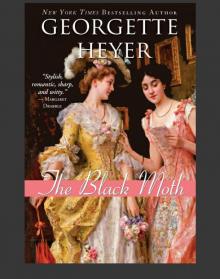 The Black Moth
The Black Moth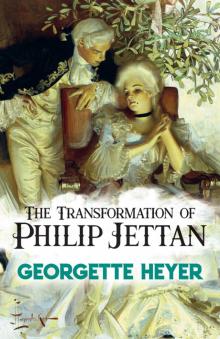 The Transformation of Philip Jettan
The Transformation of Philip Jettan Friday's Child
Friday's Child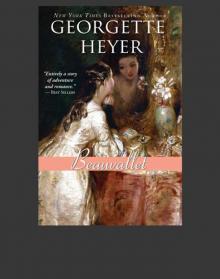 Beauvallet
Beauvallet They Found Him Dead
They Found Him Dead Charity Girl
Charity Girl Death in the Stocks: Merely Murder
Death in the Stocks: Merely Murder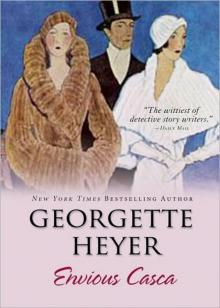 Envious Casca
Envious Casca Behold, Here's Poison
Behold, Here's Poison Arabella
Arabella The Nonesuch
The Nonesuch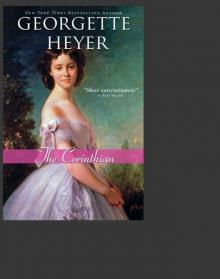 The Corinthian
The Corinthian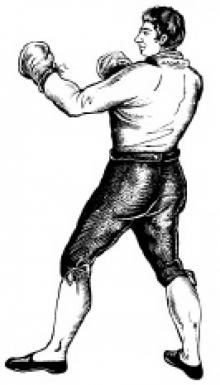 Jennifer Kloester
Jennifer Kloester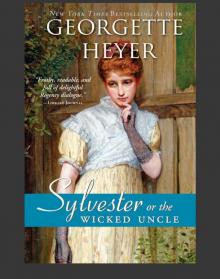 Sylvester
Sylvester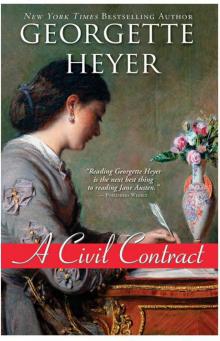 A Civil Contract
A Civil Contract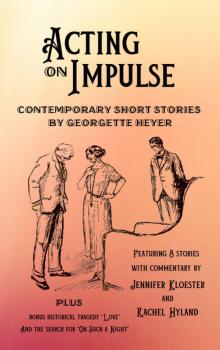 Acting on Impulse
Acting on Impulse Devil’s Cub at-2
Devil’s Cub at-2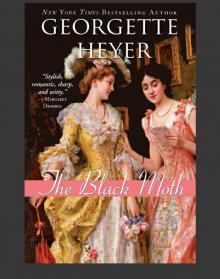 Black Moth
Black Moth Grand Sophy
Grand Sophy Instead of the Thorn
Instead of the Thorn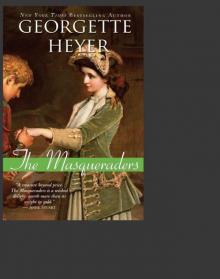 Masqueraders
Masqueraders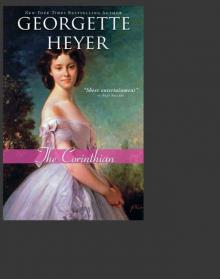 Corinthian
Corinthian Reluctant Widow
Reluctant Widow